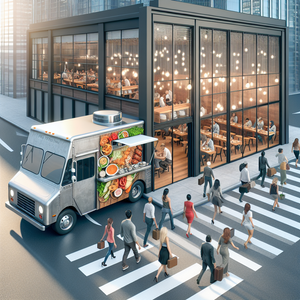
Navigating the Leap: From Food Truck to Restaurant
For many culinary entrepreneurs, the transition from food truck to a full-fledged restaurant is a dream filled with both promise and complexity. While the allure of a permanent establishment is strong, it demands meticulous planning and a strategic approach. Success stories, like that of a savvy food cart vendor who boosted revenue by 30% through innovative SMS campaigns, provide inspiration. Yet, tales from industry veterans such as Foodies TruckZ remind us of the hurdles, emphasizing the need for scalability and strategic foresight. This transition involves more than just a change in venue; it requires a shift in logistics, including a centralized commissary, and the resilience to adapt to evolving business models. As more entrepreneurs embark on this journey, understanding the critical roles that facilitate this shift becomes essential. Let's delve into the key positions that are pivotal in transforming a mobile culinary venture into a successful brick-and-mortar restaurant.
Job Summaries:
Food Truck Manager:
- The Food Truck Manager is the linchpin connecting the mobile and stationary operations.
- This role demands adept management of daily operations, staff coordination, and adherence to health regulations.
- Strong organizational skills and experience in food service management are crucial, with a background in culinary arts or business administration offering a significant advantage.
Marketing Coordinator:
- Tasked with amplifying the brand's reach, the Marketing Coordinator juggles social media, campaign development, and customer feedback analysis.
- A degree in marketing or communications coupled with digital marketing prowess is essential.
- Their work ensures brand visibility, a cornerstone for a successful restaurant transition.
Culinary Advisor:
- The Culinary Advisor guarantees that the menu resonates with the brand's ethos and customer tastes.
- Collaborating closely with chefs, they drive menu development and culinary innovation.
- A culinary degree and experience in menu planning are non-negotiable, ensuring offerings remain competitive and adaptable to a restaurant environment.
Logistics Coordinator:
- The Logistics Coordinator is vital in managing the supply chain, liaising with vendors, and optimizing inventory to minimize waste while maintaining cost-effectiveness.
- A background in supply chain management or logistics is preferred, preparing the business for the increased demands of a restaurant.
Customer Experience Specialist:
- Enhancing service quality and customer interaction
- Focusing on gathering feedback and fostering a welcoming atmosphere
- Strong interpersonal skills and a background in hospitality are crucial
- Building a loyal customer base essential for restaurant success
Event Coordinator:
- The Event Coordinator orchestrates events and catering gigs, handling logistics and client relations to generate additional revenue streams.
- Experience in event planning or hospitality management is required, positioning the food truck as a versatile service provider.
Chef de Cuisine:
- Leading the culinary team
- Ensures high-quality food preparation
- Ensures kitchen efficiency
- Culinary degree and chef experience are necessary
- Setting culinary standards
- Building a reputation for both the food truck and the future restaurant
Business Development Manager:
- The Business Development Manager identifies growth opportunities
- conducts market analysis
- negotiates partnerships
- A background in business or sales is beneficial
- plays a crucial role in scaling operations
- paves the way for the restaurant transition
Finance Officer:
- Overseeing financial planning and budgeting
- Ensures financial health and prepares strategic reports
- A degree in finance or accounting is preferred
- CPA certification is preferred
- Vital for tracking profitability
- Securing funding for expansion
Operations Analyst:
- Evaluating operational efficiency
- The Operations Analyst analyzes data and suggests improvements
- A background in operations management or analytics is required
- Essential for optimizing operations and making informed decisions for a successful transition
Transitioning from a food truck to a restaurant is a multifaceted journey that requires strategic planning and the right team. Each role, from management to culinary innovation, plays a vital part in navigating the complexities of this path. By understanding these key roles and their contributions, culinary entrepreneurs can position themselves for success in expanding their ventures. As real-life examples and expert insights suggest, with the right strategies and team in place, the dream of a bustling restaurant can become a reality.
Explore More Jobs

